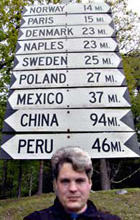![]()
Find a Flight Consider a Consolidator Rent a Car Pick a Railpass Book a Vacation Reserve a Room Choose a Cruise Get Gear Wire Money |
|
|
|||||||||||||
EUROPE FOR FREE : CITY: SECTION : experiences Speaker's
Corner A Morning
at Parliament Members of the opposing parties (left-wing Labour and right-wing Conservative) sit facing one another in two long sections of fancy, bleacher-style seats—and there's a damned good reason these bleachers were arranged so as two be two swords' lengths apart. Parliament is in session from mid-October through July. The insanely nutball quotient of inbred aristocrats was dealt a severe blow a few years ago when the government finally decided to thin the ranks of these heriditary Lords (who make up the upper house of Britian's Parliament), so the show at the House of Lords (Mon-thurs 9:30am-1pm) isn't nearly as much popcorn-crunching fun as the verbal brawl that often takes place in the House of Commons (Mon-Tues 2:30-10:30pm, Wed 9:30am-1:30pm and 2:30-10:30pm, Thirs 11;30am-7:30pm, Fri 9:30am-3pm). Admission is free; line up at the St. Stephen's entrance. Breakfast
at the Fox & Anchor Ride the Tube
to Greenwich You do have to fork over admission to get into the Cutty Sark, but since December 2001, the Royal Observatory (that's where they keep the famous clock and the Meridian line—well, the marker for it—along with historic scientific devices), and the National Maritime Museum (see the coat in which Nelson was shot, bullet hole and all) are admission free, as is admission to the Royal Naval College, a vast Christopher Wren building of 1696 (Nelson's body lay in state in Thornhill's impressive Painted Hall), which is only open 2:30 to 4:45pm. Shagged out from sightseeing, you can sun yourself, play frisbee, or just plain nap on the vast sloping park below the observatory, full of grassy lawns and spreading shade trees. The village of Greenwich itself is fun to wander and filled with some great pubs, though it's a trot down the Thames-side promenade to the best of them, Trafalgar Tavern, a rambling place with a small terrace overlooking the wide river and tall seats inside set against the bay windows (Dickens set the wedding feast in Our Mutual Friend here). A Day on Hampstead
Heath |
||||||||||||||
|
||||||||||||||
always free | sometimes free | churches experiences | parks | markets | discounts |
||||||||||||||

